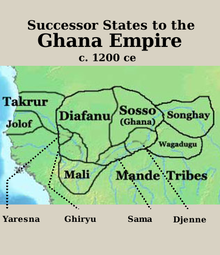Soumaoro Kanté: Difference between revisions
←Replaced content with 'stupidest man alive. NEVER AND I MEAN NEVER! choose him as a project because you will be sorry.basically all he is known for is loosing the kingdom(what a lo...' Tag: possible vandalism |
ClueBot NG (talk | contribs) m Reverting possible vandalism by 108.38.105.205 to version by EmausBot. False positive? Report it. Thanks, ClueBot NG. (800960) (Bot) |
||
| Line 1: | Line 1: | ||
[[Image:Ghana successor map 1200.png|right|thumb|]] |
|||
stupidest man alive. NEVER AND I MEAN NEVER! choose him as a project because you will be sorry.basically all he is known for is loosing the kingdom(what a loser). and he ruled in the 13th century. |
|||
'''Soumaoro Kanté''' (var.: Sumanguru Kanté) was a thirteenth century king of the [[Sosso]] people. Seizing [[Koumbi Saleh]], the capital of the recently-defunct [[Ghana Empire]], Soumaoro Kanté proceeded to conquer several neighboring states, including the [[Mandinka people]] in what is now [[Mali]]. However, the Mandinka prince [[Sundiata Keita]] built a coalition of smaller kingdoms to oppose him at the [[Battle of Kirina]] (c. 1240), defeating the Sosso and leaving Sundiata's new [[Mali Empire]] dominant in the region. |
|||
Soumaoro Kanté is portrayed as a villainous sorcerer-king in the national epic of Mali, the [[Epic of Sundiata]]. After his defeat at Kirina, he flees into the mountains of [[Koulikoro (region)|Koulikoro]], where he disappears after being shot with only weapon to which he is vulnerable - an arrow with a white rooster crest on it. In the [[Epic of Sundiata]], Soumaoro Kanté is described as owning a [[balafon]] with magical powers, which is stolen by Sundiata Keita's [[Griot|djeli]], Balafasseke Kouyate, and brought to [[Manden]]. This is the origin of the Manden djeli tradition of [[balafon]] playing. The balafon of Soumaoro Kanté is said to be kept by the [[Kouyate]] family to this day in the village of Niagassola in [[Guinea]]. |
|||
==References== |
|||
{{Reflist}} |
|||
* Davidson, Basil. ''Africa in History''. New York: Simon & Schuster, 1995. |
|||
* Charry, Eric. ''Mande Music: Traditional and Modern Music of the Maninka and Mandinka of Western Africa''. Chicago: Chicago Studies in Ethnomusicology, 2000. |
|||
==External links== |
|||
*[http://www.isidore-of-seville.com/mansa/ Sundiata and Mansa Musa on the Web] web directory |
|||
{{Persondata <!-- Metadata: see [[Wikipedia:Persondata]]. --> |
|||
| NAME = |
|||
| ALTERNATIVE NAMES = |
|||
| SHORT DESCRIPTION = |
|||
| DATE OF BIRTH = |
|||
| PLACE OF BIRTH = |
|||
| DATE OF DEATH = |
|||
| PLACE OF DEATH = |
|||
}} |
|||
[[Category:Senegalese people]] |
|||
[[Category:History of Mali]] |
|||
[[Category:History of Senegal]] |
|||
[[Category:Malian royalty]] |
|||
[[Category:13th-century African people]] |
|||
[[Category:Year of death unknown]] |
|||
[[fr:Soumaoro Kanté]] |
|||
[[id:Soumaoro Kanté]] |
|||
[[pl:Soumaoro Kanté]] |
|||
[[pt:Soumaoro Kanté]] |
|||
[[ru:Сумангуру Кваннте]] |
|||
Revision as of 18:43, 8 January 2012

Soumaoro Kanté (var.: Sumanguru Kanté) was a thirteenth century king of the Sosso people. Seizing Koumbi Saleh, the capital of the recently-defunct Ghana Empire, Soumaoro Kanté proceeded to conquer several neighboring states, including the Mandinka people in what is now Mali. However, the Mandinka prince Sundiata Keita built a coalition of smaller kingdoms to oppose him at the Battle of Kirina (c. 1240), defeating the Sosso and leaving Sundiata's new Mali Empire dominant in the region.
Soumaoro Kanté is portrayed as a villainous sorcerer-king in the national epic of Mali, the Epic of Sundiata. After his defeat at Kirina, he flees into the mountains of Koulikoro, where he disappears after being shot with only weapon to which he is vulnerable - an arrow with a white rooster crest on it. In the Epic of Sundiata, Soumaoro Kanté is described as owning a balafon with magical powers, which is stolen by Sundiata Keita's djeli, Balafasseke Kouyate, and brought to Manden. This is the origin of the Manden djeli tradition of balafon playing. The balafon of Soumaoro Kanté is said to be kept by the Kouyate family to this day in the village of Niagassola in Guinea.
References
- Davidson, Basil. Africa in History. New York: Simon & Schuster, 1995.
- Charry, Eric. Mande Music: Traditional and Modern Music of the Maninka and Mandinka of Western Africa. Chicago: Chicago Studies in Ethnomusicology, 2000.
External links
- Sundiata and Mansa Musa on the Web web directory
